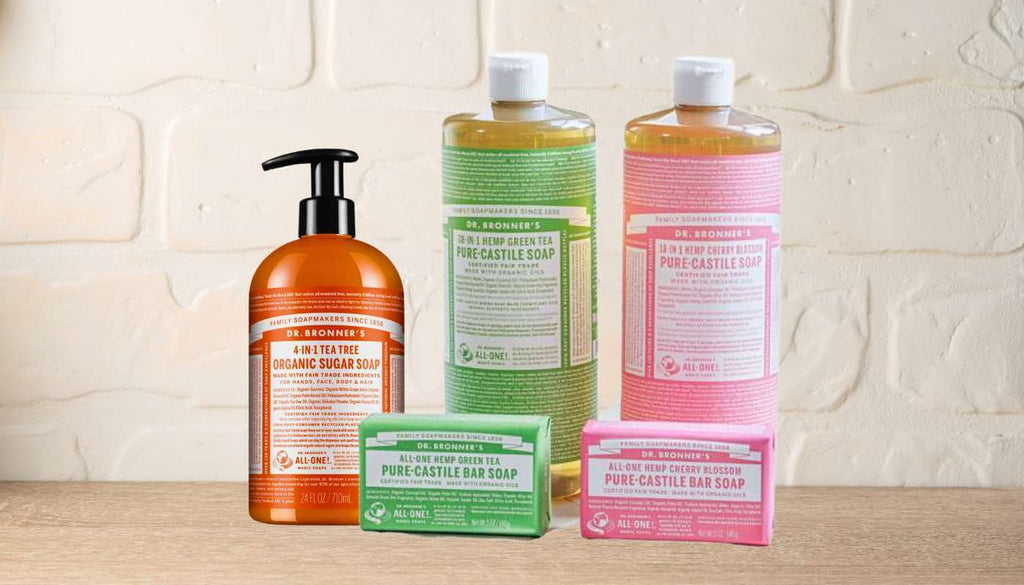
Dr. Bronner’s Soaps: Castile Soap vs Sugar Soap vs Bar Soaps
Dr. Bronner’s has three soap products that sound pretty similar: Dr. Bronner’s Pure Castile Liquid Soap, Dr. Bronner’s Bar Soap, and Dr. Bronner’s Organic Sugar Soap. And while all of Dr. Bronner’s products are great for your skin, body, and hair, you may wonder what the difference is.

Here’s a quick run down so you’ll be able to decide which one is best for you and your family.
A bit about Dr. Bronner
Dr. Bronner was not officially founded until 1948, but the family’s impressive history with soapmaking dates back up to 1858 in Laupheim, Germany. The family were the ones who invented the first liquid castile soap that was eventually seen in all the washrooms in Germany during that time. After opening Dr. Bronner in the US in the late 40s, it didn’t take them long before Dr. Bronner products became mainstream in the US.
Despite the continuous growth of the company, Dr. Bronner’s has never turned their back on their advocacy. They use regenerative organic agriculture, fair trade ingredients, packaging innovation, waste and water use reduction, with the aim of reducing their carbon footprint.
Now let's compare the three soaps.
Dr. Bronner’s Pure Castile Liquid Soap
This is the soap that started it all. Like all castile soaps, one of the main oils in the Dr Bronner’s castile soaps is olive oil. Today there are other organic oils used, too, like organic coconut oil, organic hemp oil, organic jojoba oil and organic palm oil. (See note about palm oil, below).
The main difference between the liquid castile soap and the bar soap is that the liquid soap contains more water, and uses potassium hydroxide to saponify oils (to turn it into soap). After saponification, there is no potassium hydroxide left in the final product.
Dr. Bronner’s pure castile liquid soap also contain a higher percentage of essential oils than the bar soaps, so this is better for those wanting to benefit from the scent and aroma of the more concentrated essential oils.
Dr Bronner castile soap ingredients (unscented): Water, Organic Coconut Oil, Potassium Hydroxide, Organic Palm Kernel Oil, Organic Olive Oil, Organic Hemp Oil, Organic Jojoba Oil, Citric Acid, Tocopherol
Dr. Bronner’s Organic Sugar Soap (Pump Soap)
The other Dr Bronner’s liquid soap is the organic sugar soap. Along with the base ingredients for the castile soap, the Dr. Bronner’s organic sugar soap contains organic sucrose and organic white grape juice. The sugar and white grape juice combine perfectly to keep your hair and skin nourished, hydrated, and smooth. Dr Bronners organic pump soap is good for all hair and skin types, but it is definitely a treat for people with dry skin.
Dr Bronner organic sugar soap ingredients (unscented): Organic Sucrose, Organic White Grape Juice, Organic Coconut Oil, Organic Palm Kernel Oil, Potassium Hydroxide, Organic Olive Oil, Organic Shikakai Powder, Organic Hemp Oil, Organic Jojoba Oil, Citric Acid, Tocopherol
Dr. Bronner’s Castile Bar Soap
Unlike the liquid castile soap, Dr Bronner’s bar soap sodium hydroxide to saponify the oils and turn them into soap. It makes the final soap much harder, and it becomes a bar soap.
And to make sure that the bar soap is really hard, Dr. Bronner’s add palm oil and salt to the mix. Adding the extra ingredients means that the bar soap doesn’t turn to mush easily. There’s also a difference in the way the hemp oil and jojoba oils are added to the bar soap. The end result is that the Dr. Bronner’s pure castile bar soap more moisturising than the liquid soap version, and it has a creamier lather.
Dr Bronner castile bar soap ingredients (unscented): Organic Coconut Oil, Organic Palm Oil, Sodium Hydroxide, Water, Organic Olive Oil, Organic Hemp Oil, Organic Jojoba Oil, Sea Salt, Citric Acid, Tocopherol
Dr Bronner Ethical Standards and Palm Oil
It’s worth mentioning that Dr. Bronner maintains third party certifications that proves that their products are not only of high quality, but standards for ecological and social sustainability are also met. Third party certifications that shows that Dr. Bronner uses organic ingredients include: USDA organic, Oregon Tilth Certified organic, and NSF: Personal Care Products Containing organic Ingredients. Fair for Life certification verifies ethical working conditions and fair prices. Leaping Bunny and Vegan Action certifies that products are not tested on animals and products do not contain animal products or byproducts.
Other certifications include B Corp certification which confirms the company meets social and environmental performance, accountability, and transparency. Non-GMO Project ensures the products are free from GMO engineering and contamination. OK Kosher confirms that final products, and even the manufacturing process strictly comply with kosher food laws.
Dr Bronner’s uses organic and fair trade palm oil from Ghana. Serendipalm, the palm oil supplier and Dr Bronner sister company, chose Ghana because palm oil production there because it doesn’t cause new deforestion, endanger crucial habitats or impoverish communities. See more about Dr Bronner’s palm oil here.
Hello Charlie stocks a huge range of Dr Bronner's products. Shop them here.
Image credit: Dr. Bronner





